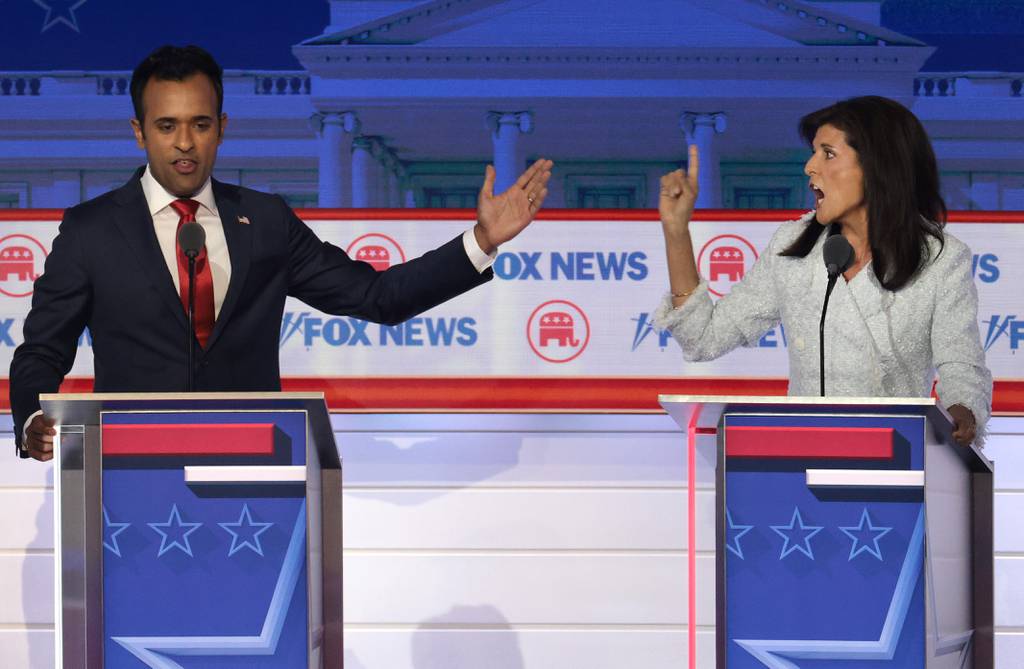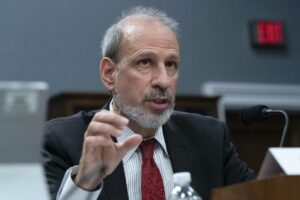
WASHINGTON ― Republican presidential candidates sparred over continuing Ukraine assistance during their first 2024 debate Tuesday night, highlighting the fractious intraparty divide in the House over President Joe Biden’s request for a fifth aid package to the war-torn country.
Florida Governor Ron DeSantis and Vivek Ramaswamy argued in favor of ending Ukraine aid, putting them at odds with former Vice President Mike Pence, former UN ambassador Nikki Haley and former New Jersey Governor Chris Christie.
The discussion mirrored arguments that have played out on Capitol Hill for nearly a year, with the fate of Biden’s latest $24 billion Ukraine aid request uncertain in the hands of a Republican-held House largely influenced by the conservative Freedom Caucus. Biden’s recent request includes $13 billion for the Pentagon to backfill U.S. weapons sent to Ukraine
“I will have Europe pull their weight,” said DeSantis. “Our support should be contingent on them doing it.”
DeSantis said he would devote more resources into countering China. And Ramaswamy said he would put those funds toward the southern border, likening Russia’s bloody invasion — which has killed thousands of Ukrainian civilians — to migrant crossings at the U.S. southern border.
“This is disastrous,” said Ramaswamy. “We are protecting an invasion across somebody else’s border when we should use those same military resources to prevent ... the invasion of our own southern border here in the United States of America.”
The $61.4 billion in military aid for Ukraine over four separate funding packages Congress passed since the war began last year includes heavy artillery like HIMARs and munitions like anti-tank missiles — equipment not used in border patrol operations.
Former President Donald Trump, who did not attend the debate, also opposes continuing Ukraine aid.
An August CNN-SSRS poll found that 71% Republicans oppose Congress passing new Ukraine aid, while 62% of Democrats favor more assistance for Kyiv.
House Speaker Kevin McCarthy, R-Calif., voted for Ukraine aid last year, but in recent months has repeatedly shot down calls for another assistance package to Kyiv or any other additional military spending that would circumvent the $886 billion defense budget caps in the debt ceiling agreement.
Several conservative lawmakers from the Freedom Caucus raised Ukraine as one of their sticking points with McCarthy in his contentious speakership race in January. The weeklong stale mate ended when McCarthy won over the right flank of the caucus with numerous concessions.
Further complicating matters, the Freedom Caucus has threatened to block passage next month of a short-term funding bill needed to avoid a partial government shutdown unless they receive a series of concessions, including an end to unspecified “woke” military policies.
McCarthy’s precarious position puts him at odds with Senate Minority Leader Mitch McConnell, R-Ky., who has joined Senate Republicans in calling for more aid to Kyiv as well as additional defense spending beyond the debt ceiling caps.
Speaking at the debate, Pence, Haley and Christie used many of the same arguments employed by McConnell to support continued U.S. assistance to Ukraine.
“Anybody that thinks we can’t solve the problems here in the United States and be the leader of the free world has a pretty small view of the world,” said Pence. He invoked former President Ronald Reagan to vaunt the U.S. as “the leader of the free world and the arsenal of democracy,” while stating that Russian President Vladimir Putin wants to “reestablish the old Soviet sphere of influence.”
Haley said the U.S. has given less than 3.5% of its defense budget to Ukraine, and pointed out that “if you look at the percentage per GDP, 11 of the European countries have given more than the U.S.”
Christie sided with Haley and Pence. Sen. Tim Scott, R-S.C., did not weigh in on the topic, but has voted for Ukraine aid.
North Dakota Governor Doug Bergum argued “Ukraine is an example of when deterrence fails,” and called for arming Taiwan with weapons such as Harpoon anti-ship missiles to deter a potential Chinese invasion of the self-governing island.
Bryant Harris is the Congress reporter for Defense News. He has covered U.S. foreign policy, national security, international affairs and politics in Washington since 2014. He has also written for Foreign Policy, Al-Monitor, Al Jazeera English and IPS News.
- SEO Powered Content & PR Distribution. Get Amplified Today.
- PlatoData.Network Vertical Generative Ai. Empower Yourself. Access Here.
- PlatoAiStream. Web3 Intelligence. Knowledge Amplified. Access Here.
- PlatoESG. Automotive / EVs, Carbon, CleanTech, Energy, Environment, Solar, Waste Management. Access Here.
- PlatoHealth. Biotech and Clinical Trials Intelligence. Access Here.
- ChartPrime. Elevate your Trading Game with ChartPrime. Access Here.
- BlockOffsets. Modernizing Environmental Offset Ownership. Access Here.
- Source: https://www.defensenews.com/congress/2023/08/24/gop-debates-ukraine-rift-previews-congress-upcoming-aid-fight/
- :has
- :is
- :not
- 11
- 12
- 2014
- 2024
- 70
- a
- across
- Additional
- Affairs
- Aid
- AL
- also
- Ambassador
- america
- an
- and
- Another
- any
- ARE
- argued
- arguments
- Arsenal
- AS
- Assistance
- At
- attend
- avoid
- BE
- began
- Beyond
- Bill
- Billion
- Block
- Bloody
- border
- budget
- but
- by
- called
- calling
- Calls
- candidates
- caps
- ceiling
- China
- chinese
- Chris
- civilians
- CNN
- concessions
- Congress
- conservative
- continued
- continuing
- countries
- country
- covered
- Dakota
- debate
- Debt
- Defense
- Democracy
- Democrats
- DID
- disastrous
- doing
- donald
- Donald Trump
- doug
- down
- during
- Else’s
- employed
- end
- ending
- English
- equipment
- Ether (ETH)
- Europe
- European
- European Countries
- example
- fails
- fate
- favor
- fifth
- fight
- First
- For
- foreign
- foreign policy
- Former
- found
- four
- Free
- Freedom
- from
- funding
- funds
- GDP
- given
- Government
- Governor
- Hands
- Have
- he
- heavy
- here
- highlighting
- him
- his
- House
- HTML
- HTTPS
- images
- in
- includes
- Including
- influence
- influenced
- International
- into
- invasion
- invoked
- island
- IT
- ITS
- January
- Jersey
- joe
- joined
- jpg
- largely
- Last
- Last Year
- latest
- lawmakers
- leader
- less
- like
- Look
- many
- Matters
- mike
- Military
- missiles
- Mitch McConnell
- Month
- months
- more
- National
- national security
- nearly
- needed
- New
- New Jersey
- news
- next
- night
- numerous
- Odds
- of
- Old
- on
- ONE
- Operations
- oppose
- or
- Other
- our
- out
- over
- own
- package
- packages
- passage
- Passing
- pentagon
- per
- percentage
- plato
- Plato Data Intelligence
- PlatoData
- played
- points
- policy
- politics
- position
- potential
- president
- President Donald Trump
- presidential
- presidential candidates
- pretty
- Previews
- problems
- protecting
- put
- Putin
- Puts
- Putting
- Race
- raised
- receive
- recent
- REPEATEDLY
- reporter
- Republican
- Republicans
- request
- Resources
- rift
- right
- RON
- s
- Said
- same
- scott
- security
- Senate
- sent
- separate
- Series
- short-term
- shot
- should
- shutdown
- since
- small
- SOLVE
- Southern
- Speaker
- Spending
- States
- stating
- sticking
- such
- support
- Taiwan
- than
- that
- The
- The United States of America
- the world
- their
- Them
- they
- Thinks
- those
- thousands
- Tim
- to
- topic
- toward
- trump
- Tuesday
- u.s.
- Ukraine
- Ukrainian
- UN
- Uncertain
- United
- United States
- UNITED STATES OF AMERICA
- upcoming
- use
- used
- vice
- Vice President
- View
- Vladimir Putin
- voted
- wants
- war
- washington
- we
- Weapons
- weeklong
- weigh
- weight
- WELL
- when
- which
- while
- WHO
- will
- with
- Won
- world
- would
- written
- year
- you
- zephyrnet












